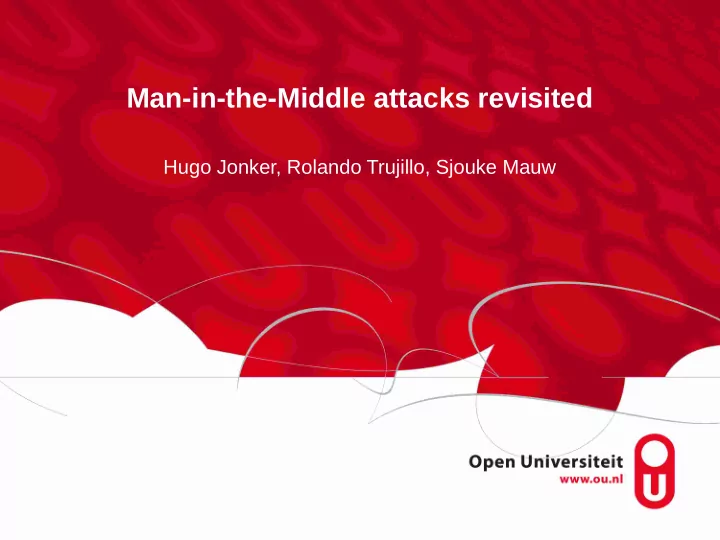

Man-in-the-Middle attacks revisited Hugo Jonker, Rolando Trujillo, Sjouke Mauw
Man-in-the-middle attack Diffie-Hellman Alice Bob new na new nb g na g nb K = (g nb ) na K = (g na ) nb
Man-in-the-middle attack Diffie-Hellman Alice Bob Alice Eve new na new nb new na new nb g na g na g nb g nb K = (g nb ) na K = (g na ) nb
Man-in-the-middle attack Diffie-Hellman Diffie-Hell, man! Alice Bob Alice Eve new na new nb new na new nb g na g na g nb g nb K = (g nb ) na K = (g na ) nb
Needham-Schroeder Roger Michael new na new nb {Roger, na} pk(Michael) {na, nb} pk(Roger) {nb} pk(Michael) Talking to Roger
Needham, Schroeder & Lowe '95 Roger Gavin Gavin Michael new na new nb {Roger, na} pk(Gavin) {Roger, na} pk(Michael) {na, nb} pk(Roger) {na, nb} pk(Roger) {nb} pk(Gavin) {nb} pk(Lowe) Talking to Roger
Just a few of many examples ● Academic: – Diffie-Hellman: 1976? – Lowe on Needham-Schroeder: 1995 ● Practice: – Moxie Marlinspike: ● SSLsniff: 2002 attacks IE5.5 ● SSLstrip: 2009 (Black Hat 2009) Conclusion: we're abundantly aware.
Stopping the MitM? ● Theory: – Modelchecking (~ 1995) – Tagging (~ 2003) – Tool support (mCRL, Scyther, Tamarin,...) ● Practice: – Certificate Authorities – DNSSec – Certificate Pinning – ...
Stopping the MitM? ● Theory: – Modelchecking (~ 1995) – Tagging (~ 2003) – Tool support (mCRL, Scyther, Tamarin,...) ● Practice: – Certificate Authorities – DNSSec – Certificate Pinning – ... Conclusion: we've got this.
Meanwhile...
POODLE attack [MDK14] ● Force downgrade of TLS ● Attack SSLv3.0 – RC4 is biased
FREAK attack [S&P15] ● US export restrictions mandated weak crypto (RSA < 512 bits) ● Still supported in some TLS implementations ● MitM changes cipher spec to “weak crypto”
LOGJAM attack [CCS15]
DROWN attack [ASS+16] ● Take client's encrypted TLS messages ● Use SSLv2.0 server as decryption oracle
DROWN attack [ASS+16] ● Take client's encrypted TLS messages ● Use SSLv2.0 server as decryption oracle In general, the attacker must passively capture about 1,000 TLS sessions using RSA key exchange, make 40,000 SSLv2 connections to the victim server and perform 2 50 symmetric encryption operations.
That's all theoretical, right? MitM devices for cellphones: ● Stingray: $68,000 ● Gossamer: $19,000 ● Triggerfish: $90,000 ● Hailstorm: $170,000
Conclusion: We definitely do not “have” this.
Exploited flaws ● POODLE, Logjam, FREAK, DROWN: initialisation ● Cellphone MitM devices: new properties Both cases: not accounted for by protocol.
Categorising attacks ● Protocol context – Initialisation ● User context – location
Solution directions Embed context into formal security proofs ● With a trusted partner: context agreement ● Without a trusted partner: context verification
Context agreement Note: agreement on observed context, not on actual context.
Context verification
Example application: GSM
Conclusion ● Man-in-the-middle attacks still exist ● They are preventable ● Prevention: – Account for context ● Protocol context (initialisation) ● User context (location) – With or without trusted partner
Thank you for your attention!
Recommend
More recommend